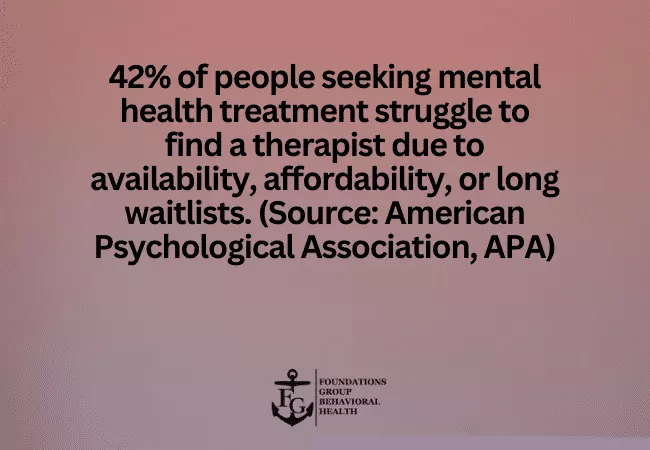Finding the right therapist is a crucial step in managing mental health challenges and achieving emotional well-being. Whether you’re seeking therapy for anxiety, depression, ADHD, trauma, or other mental health concerns, having a therapist who understands your needs and offers effective treatment can make all the difference.
With so many therapy options available, it can be overwhelming to determine which provider best suits your personal goals and preferences. A good therapist can provide not only a safe and supportive space for self-exploration but also practical coping strategies that lead to measurable improvements in mental health.
At Foundations Group Behavioral Health, we offer a variety of Mental Health Treatment Programs, including Psychiatric Day Treatment, Half-Day Treatment Programs, and Outpatient Mental Health Programs, to ensure individuals receive the right level of care tailored to their needs. This guide will walk you through the process of choosing a new therapist and ensuring you receive the best possible support.
Why Choosing the Right Therapist Matters
Therapy is more than just talking—it is about creating a trusting relationship with a professional who can guide you through mental health challenges, help you build resilience, and equip you with tools to improve your well-being.
Research shows that the quality of the therapeutic alliance—the bond between therapist and client—is one of the strongest predictors of therapy success. If you feel comfortable with your therapist, you are more likely to open up, engage in the process, and see positive results.
The right therapist can help you:
- Improve self-awareness and emotional regulation
- Develop healthier coping mechanisms
- Manage symptoms of anxiety, depression, PTSD, ADHD, and other mental health conditions
- Build confidence and resilience in handling stress and relationships
If therapy does not feel effective or you struggle to connect with your therapist, it may be time to consider switching therapists or exploring alternative treatment programs.
Signs That You May Need a New Therapist
Sometimes, a therapist-client relationship is not the right fit, or the approach used does not align with your needs. It is important to recognize when it might be time to seek a new provider.
Here are some common signs that you may benefit from finding a new therapist:
- You feel uncomfortable or judged in therapy sessions
- The therapist’s treatment approach does not resonate with you
- You are not making progress despite consistent attendance
- You struggle to open up and share your thoughts
- The therapist lacks experience in treating your specific condition
- Your therapist is frequently late, distracted, or dismissive
- The therapy process feels unstructured or directionless
Switching therapists is completely normal, and prioritizing your mental health by finding the right professional is an important step toward healing.
How to Choose a New Therapist
1. Identify Your Mental Health Needs
Before beginning your search, reflect on what you need from therapy and what goals you want to achieve.
Ask yourself:
- Are you seeking therapy for anxiety, depression, PTSD, ADHD, or another condition?
- Do you prefer structured therapy with specific goals, or an open-ended, exploratory approach?
- Would you benefit from individual therapy, group therapy, or family therapy?
- Do you need a therapist who specializes in trauma, relationships, stress management, or self-esteem?
- Are you looking for a therapist who can prescribe medication or work alongside a psychiatrist for treatment?
Understanding your needs can help you narrow down your options and find a therapist who specializes in the right Mental Health Treatment Program for your condition.
2. Consider the Type of Therapy That Best Suits You
Therapists use different approaches based on your mental health concerns. Some of the most common therapeutic modalities include:
- Cognitive Behavioral Therapy (CBT): Focuses on identifying and changing negative thought patterns and behaviors
- Dialectical Behavior Therapy (DBT): Helps individuals develop emotional regulation and distress tolerance skills
- Trauma-Informed Therapy: Designed for individuals who have experienced trauma or PTSD
- Psychodynamic Therapy: Explores past experiences and unconscious thought patterns
- Acceptance and Commitment Therapy (ACT): Encourages mindfulness and acceptance of emotions
- Exposure Therapy: Used for anxiety disorders and PTSD by gradually exposing individuals to feared situations
If you have a complex mental health condition, such as co-occurring disorders or treatment-resistant anxiety, consider programs like Psychiatric Day Treatment or Co-Occurring Disorder Treatment Programs, which provide a higher level of care.
3. Research Therapists and Treatment Centers
Once you have identified your needs and therapy preferences, begin researching potential therapists or treatment centers in your area.
Key factors to consider when researching therapists:
- Credentials and Licensing: Ensure that the therapist is licensed and has relevant experience in treating your specific mental health concern
- Specialization: Look for therapists who focus on anxiety, depression, PTSD, ADHD, or trauma-related conditions
- Therapy Style: Some therapists use structured approaches with assignments, while others take a more conversational, exploratory approach
- Availability: Consider appointment availability and whether they offer in-person or virtual sessions
- Insurance and Payment Options: Check if they accept your insurance or offer sliding-scale payment options
For those looking for comprehensive treatment, a Behavioral Health Treatment Center in Massachusetts, like Foundations Group Behavioral Health, can match you with the right therapist or mental health program.
4. Schedule an Initial Consultation
Many therapists offer an initial consultation to help determine if they are the right fit for you.
Questions to ask during a consultation:
- What is your experience in treating my condition?
- What is your therapy style, and how do you approach treatment?
- What should I expect in my first few sessions?
- How do you measure progress in therapy?
A consultation allows you to gauge whether you feel comfortable with the therapist and if their approach aligns with your goals.

5. Consider Mental Health Treatment Programs for More Comprehensive Support
If traditional therapy sessions are not enough to manage your symptoms, structured mental health programs can provide higher levels of care.
At Foundations Group Behavioral Health, we offer:
Psychiatric Day Treatment
- A structured, full-day program for individuals with severe anxiety, depression, PTSD, or other conditions
- Includes individual therapy, group therapy, and medication management
- Suitable for individuals transitioning out of inpatient care or needing intensive support
Half-Day Treatment Program
- Designed for individuals who need structured therapy while maintaining daily responsibilities
- Focuses on coping skills, emotional regulation, and behavioral therapy
- Offers group and individual therapy sessions
Outpatient Mental Health Program
- Provides long-term therapy for individuals managing anxiety, depression, ADHD, and co-occurring disorders
- Includes weekly therapy sessions with licensed professionals
- Flexible scheduling for those balancing work, school, or family life
These programs offer specialized, intensive support beyond traditional therapy sessions, making them a great option for individuals needing additional mental health care.
Conclusion
Choosing a new therapist is an important decision that can greatly impact your mental health journey. By taking the time to evaluate your needs, explore different therapy approaches, and assess the therapist-client relationship, you can ensure that you receive the support that best aligns with your personal goals.
If you require a higher level of care, programs such as Psychiatric Day Treatment, Half-Day Treatment Programs, and Outpatient Mental Health Programs offer structured and comprehensive approaches for managing anxiety, depression, PTSD, ADHD, and co-occurring disorders.
If you are searching for a qualified therapist or structured mental health program, Foundations Group Behavioral Health is here to help.
Call us today at 888.685.9730 to explore our treatment options and take the next step toward your mental well-being. You deserve a therapist who understands you. You deserve the right care. You deserve to heal.
FAQ on Finding Therapist
Why is finding the right therapist important?
Choosing the right therapist is essential for effective mental health treatment. A strong therapist-client relationship helps build trust, encourages openness, and improves therapy outcomes.
How do I know if I need a new therapist?
You may need a new therapist if you feel uncomfortable, are not making progress, do not connect with their therapy style, or if they lack experience with your specific mental health condition.
What are the different types of therapy available?
Common therapy approaches include Cognitive Behavioral Therapy (CBT), Dialectical Behavior Therapy (DBT), trauma-informed therapy, psychodynamic therapy, and group therapy.
What questions should I ask a potential therapist?
Ask about their experience treating your condition, therapy style, expected progress, and availability for sessions. A consultation session can help determine if they are a good fit.
What should I do if traditional therapy isn’t enough?
If weekly therapy sessions are not providing enough support, consider structured programs like Psychiatric Day Treatment, Half-Day Treatment Programs, or Outpatient Mental Health Programs for more intensive care.
Can I switch therapists if I don’t feel comfortable?
Yes. It is completely normal to switch therapists if you feel the relationship is not beneficial. Finding the right therapist is a personal journey, and prioritizing your mental health is key.
How do I choose between in-person and online therapy?
Consider your comfort level, schedule, and the type of therapy you need. Online therapy offers flexibility, while in-person sessions may provide deeper engagement.
What if I need therapy for multiple mental health conditions?
For individuals with co-occurring disorders such as anxiety, depression, or ADHD, a Co-Occurring Disorder Treatment Program can provide integrated care for multiple conditions.








